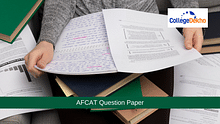Check GATE 2024 Psychology chapter or subject-wise weightage here. In addition, candidates can also check the list of best books, exam patterns, sample papers, and marking schemes for GATE Metallurgy here.

GATE 2024 Syllabus for Psychology (XH - C4) -
IISc Bangalore has conducted the GATE 2024 Psychology (XH - C4) Exam on
February 4, 2024
. The official GATE 2024 Syllabus for Psychology PDF is available on the official website. Earlier GATE was used to be conducted for admission into only postgraduate level programmes like M.Tech, MS, M.E, Direct Ph.D., etc offered at various institutions of national repute like the IITs, NITs, IISc Bangalore, etc. From GATE 2021 onwards, the exam is being conducted for subjects from two new streams - Humanities & Social Sciences and Environmental Science & Engineering. Candidates who desire to study subjects such as Philosophy, Psychology, Sociology, Philosophy, Economics, Linguistics, English, and Environmental Science and Engineering from one of the reputed
GATE 2024 participating institutions
must apply for the GATE exam.
This article comprises all the details regarding the GATE 2024 exam, like the
GATE syllabus 2024
, important topics, sample question papers, best books, exam pattern, etc. Check out all the details concerning
GATE 2024
Psychology exam from the sections below.
Also read:
GATE Syllabus 2024
GATE 2024 Psychology Syllabus
All the important topics on which the questions in the Psychology paper of the GATE 2024 exam will be based have been provided below. Candidates can simply access the GATE 2024 Psychology exam syllabus by clicking on the link provided below -
| Detailed Syllabus for Psychology Paper of GATE 2024 Exam |
|---|
GATE 2024 Psychology Chapter-Wise Syllabus
Here is the list of all those important chapters from where the GATE 2024 Psychology paper questions will be formed -
| Name of the Chapter | Important Topics |
|---|---|
| Applications of Psychology | Psychological disorders: Conceptions of mental disorders; Assessment and diagnosis, DSM and Other tools, PTSD and Trauma; Psychotherapies: Psychodynamic, Phenomenological/Experiential therapy; Behaviour therapy; cognitive therapy; biological therapy, Applications of theories of motivation and learning in School: Factors in educational achievement; counselling & guidance in schools, Application of theories of motivation, learning, emotions, perceptions, group dynamics & leadership to organizational setup, Issues of Personal space, crowding, and territoriality. |
| Development Across the Life Span | Nature versus nurture in human development, Prenatal development: Chromosomes, Genes and DNA. Physical, cognitive and psychosocial development in infancy, childhood, adolescence and adulthood, Theories of aging, Moral development. |
| Social Psychology | Social perception: Attribution; impression formation; social categorization, implicit personality theory, Social influence: conformity, compliance and obedience, Attitudes, beliefs and values: Evaluating the social world, attitude formation, attitude change and persuasion, cognitive dissonance, Prejudice, discrimination, Aggression, power and prosocial behavior, Belief systems and value patterns. Group dynamics, leadership style and effectiveness, Theories of intergroup relations and conflicts. |
| Motivation, Emotion, Stress and Coping | Approaches to understanding motivation: instinct, drive-reduction, arousal, incentive, humanistic, Achievement motivation, Intrinsic motivation, aggression, curiosity and exploration, Emotions: nature of emotions; biological basis of emotions, Theories of emotions: James-Lange, Canon-Bard, Schachter and Singer, Lazarus, Definition of stress; what are stressors; cognitive factors in stress, Factors in stress reaction: General adaptation syndrome; effect of stress, Coping with stress: problem-focused coping; emotion-focused coping, REBT and meditation |
| Personality | Theories of personality: Psychoanalytic, behaviorist, social cognitive view, humanism and trait and type theories, Biology of personality and Assessment of personality. |
| Cognition | Thinking, Intelligence and Language: Basic elements of thought: Concepts, Propositions, Imagery. Current paradigms of cognitive psychology – Information processing approach, ecological approach, Problem-solving: Methods of problem-solving, Strategies and obstacles, Role of Metacognitive processing, decision-making: choosing among alternatives, Intelligence: Theories of intelligence (Spearman; Thurstone; Jensen; Cattell; Gardner; Stenberg) and Emotional Intelligence; Measuring intelligence, Individual differences in Intelligence; Role of heredity and environment, Difference between Intelligence, Aptitude and Creativity |
| Perception, Learning, Memory and Forgetting | What is a sensation, sensory thresholds and sensory adaptations, Vision, hearing, touch and pain, smell and taste, kinesthesis and vestibular sense, Perception: role of attention; organizing principles of perception, gestalt perception, depth perception and illusions, Theories of learning: classical conditioning, operant conditioning, social learning theory, cognitive learning, Memory: encoding, storage, retrieval, Information processing theories of memory, Retrieval in Long term memory, reconstructive nature of long-term memory, Forgetting: encoding failure, interference theory, memory trace decay theory, the physical aspects of memory. |
| Biological and Evolutionary Basis of Behaviour | Heredity and behaviour Evolution and natural selection, Nervous system, structures of the brain and their functions, Neurons: Structure, functions, types, neural impulse, synaptic transmission. Neurotransmitters. Hemispheric lateralization, The endocrine system types and functions, Biological basis of Motivation: Hunger, Thirst, Sleep and Sex. The biological basis of emotion: The Limbic system, Hormonal regulation of behaviour. Methods of Physiological Psychology: Invasive methods – Anatomical methods, degeneration techniques, lesion techniques, chemical methods, microelectrode studies, Non-invasive methods – EEG, Scanning methods, Muscular and Glandular system: Genetics and behaviour: Chromosomal anomalies; Nature-Nurture controversy [Twin studies and adoption studies] |
| Psychometrics | Foundations of Psychological measurement; Basic components: scales and items’ Construction and analysis of items: Intelligence test items, performance tests, Ability & Aptitude test, Personality questionnaires. Method of test construction, Standardization of measures: Reliability, Validity, Norms, Application of assessment and measurements in Tests— Applications of psychological testing in various settings-educations, counselling and guidance, clinical, organizational and developmental. |
| Research Methods and Statistics |
|
Best Books for GATE 2024 Psychology Exam
Candidates desiring to succeed in the GATE 2024 psychology exam with exemplary marks must make sure they have their hand on the GATE 2024 best books to prepare from and study materials to refer to. After doing a bit of research on what supposedly could be the best books for PG-level Psychology entrance exams, we have come up with a list of the following books which should help the candidates achieve their goals -
MCQs in Psychology - Objectives for JRF/UGC NET and Other Competetive Examinations
Question Bank Psychology - SLET/UGC NET/SPSC/UPSC/Other Higher Grade Examinations
NTA UGC NET Psychology Paper-II (recent edition)
Objective Psychology (Popular Master Guide) Paperback
Sample Question Papers for GATE 2024 Psychology Paper
The best way to assess the preparation levels before a major entrance exam is to solve the previous year's question papers, mock test papers, and sample test papers. The best way to measure the preparations is to attempt the GATE 2024 Psychology sample test papers available on the official website of the IISC Bangalore. To start downloading the GATE sample question paper for the Psychology exam, the candidates must click on the direct link provided below -
| GATE Psychology Sample Question Papers - Download Here! |
|---|
GATE 2024 Psychology Exam Pattern and Marking Scheme
As the exam pattern and marking scheme of the GATE 2024 Psychology exam will be different from the usual papers for which GATE has been usually conducted to date, we decided to provide the candidates with a detailed explanation of the GATE Psychology exam pattern and marking scheme -
Name of the Section | Number of Questions | Marks Carried | Question Distribution |
|---|---|---|---|
General Aptitude | - | 15 | - |
Reasoning and Comprehension | 15 | 25 |
|
Psychology Paper Section | 40 | 60 |
|
Marking Scheme
The marking scheme is given in the table below -
Marks Carried by Each Question | Negative Marking |
|---|---|
1 mark questions | 1/3rd of maximum marks carried by each question |
2 marks questions | 2/3rd of maximum marks carried by each question |
MSQ type questions | No negative marking |
Related topics
| GATE Cutoff | GATE Question Papers |
Related Articles


















Similar Articles
Zakir Husain Delhi College CUET UG Cutoff 2024: Expected Cutoff based on Previous Trends
Sri Guru Nanak Dev Khalsa College CUET Cutoff 2024: Expected Cutoff based on Previous Trends
Shyama Prasad Mukherjee College for Women CUET UG Cutoff 2024: Expected Cutoff based on Previous Trends
Shyam Lal College CUET Cutoff 2024: Expected Cutoff based on Previous Trends
Shaheed Bhagat Singh College CUET UG Cutoff 2024: Expected Cutoff based on Previous Trends
Satyawati College CUET UG Cutoff 2024: Expected Cutoff based on Previous Trends